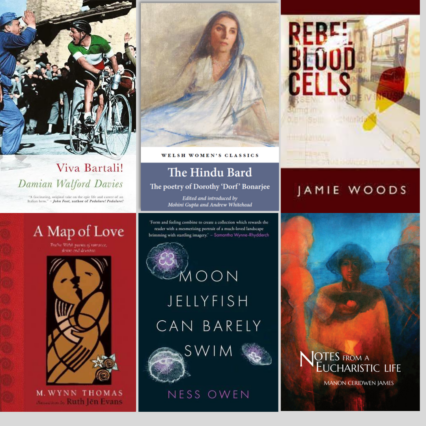While the weather may not be offering much in the way of sunshine right now, Wales Arts Review is here to brighten your summer with our top picks for your summer reads 2023. To conclude our run-down of the books we’re reading this summer, we take a dive into the world of poetry to look at some of the collections which have been released in time for this summer.
Octopus Mind by Rach el Carney (Seren Books)
el Carney (Seren Books)
Octopus Mind explores the intricacies of neurodiversity, perception and the human mind. These poems articulate the desire to understand and be understood by oneself and others in a complex world. They observe the nuances of creativity, art, relationships, and self-expression through the lens of neurodiversity, reflecting on the poet’s experience of being diagnosed with dyspraxia as an adult. The poems in the collection respond to visual artists like Gwen John, whose paintings break new ground for women representing their own visions of themselves. Other poems suggest that this can be a struggle however, as Pablo Picasso paints not a woman but his own despair in ‘Blue Nude’, while Elizabeth Siddal reflects on her own image, fetishized by the Pre-Raphaelite painters, and Henri Rousseau’s painting becomes an outlet for self-deception and frustration.
Rebel Blood Cells by Jamie Woods (Pink Dust Poetry)
Poet (and erstwhile Wales Arts Review contributor) Jamie Woods charts his own experiences of being diagnosed with leukaemia in this powerful sequence of poems that seeks to unearth the nuances of his navigating through diagnosis and treatment. You can read more about Jamie’s process in writing the collection here.
The Hindu Bard by Dorothy Bonjaree (Honno Press)
This first ever collection of poet Dorothy ‘Dorf’ Bonarjee’s verse reveals something of her life in India, having been born in1894 into an elite Bengali family. As a child, she moved to London and in 1912 she enrolled at the University College of Wales at Aberystwyth. Two years later, she was awarded the Bardic chair at the UCW Eisteddfod, and went on to publish poems in Welsh journals. Bonarjee later took a law degree at the University of London and eloped with a French artist. France remained her home for the rest of her life. A beautiful collection released earlier this year by Honno Press and edited by Mohini Gupta and Andrew Whitehead.
Last Poem for Sarah and Other Poems by John Powell Ward (Seren Books)
Leading with an elegy for his late wife Sarah, John Powell Ward marks the seventh decade of his career with Last Poem for Sarah. The collection contains a sequence of fourteen sonnets of “childhood and after”, where intense memories of joy and pain are captured precisely. There are striking stories here, like that of a mother desperately trying to appease and breastfeed her baby on the train. There is the tale of a grammar school-teacher who regularly erupted into violence and hit the boys with the lids of their desks, and a vivid portrait of brothers visiting a log cabin in Ontario where ice is ten feet thick. It’s an evocative and fascinating series of poems, firmly grounded within a lengthy tradition of writing from Wales.
A Map of Love: Twelve Welsh Poems of Romance, Desire and Devotion by M. Wynn Thomas (Calon Books)
Featuring twelve pieces dating from the fourteenth century to the present, this absorbing collection deliberately veers far from clichéd verses with its poems of regret and of mourning; straight love and gay love; bawdy verses of passion and desire, and gentle meditations on motherhood and marriage. It features anonymous and lesser-known writers as well as household names such as Gillian Clarke and R. S. Thomas, and it includes a previously unpublished poem by Emyr Humphreys. With original illustrations by Ruth Jên Evans throughout, this short but powerful collection has plenty to say about love, people and their complex relationships.
Moon Jellyfish Can Barely Swim by Ness Owen (Parthian)
Moon jellyfish live a life adrift, relying on the current to take them where they need to go. They are the ultimate survivors and one of the most successful organisms of animal life. So how do they thrive in the open ocean when they can barely swim? Ness Owen uses this poignant selection of poems to delve into questions of womanhood, language and identity, asking what it really means to move with the flow of an ever-changing environment.
Viva Bartali by Damian Walford Davies (Seren Books)
Inspired by the lyrical, mythic mode of Italian sports journalism from the 1930s to the 1950s, Viva Bartali! is a biography-in-verse of the iconic Italian cyclist Gino Bartali (1914—2000), two-time winner of the Tour de France (1938, 1948), known both as ‘Gino the Pious’ because of his fervent Catholic faith, and as Ginettaccio (‘Gino the Terrible’), owing to the short shrift he so often gave the Press. The collection gives us an insight into the complex relationship that underpinned his great rivalry with the campionissimo (‘champion of champions’) Fausto Coppi – the ‘man of glass’ against Bartali’s ‘man of iron’.
Notes From a Eucharistic Life by Manon Ceridwen James (Cinnamon Press)
How do we relate the different parts of our lives and the identities that others see us by to each other? In Notes from a Eucharistic Life, Manon Ceridwen James explores the range of stories we tell about ourselves and the stories others tell about us – Mother, woman, Welsh, priest, lecturer, football fan, comedian…each call for attention, sometimes integrating, sometimes competing for space.










